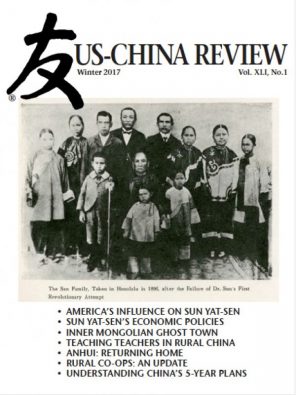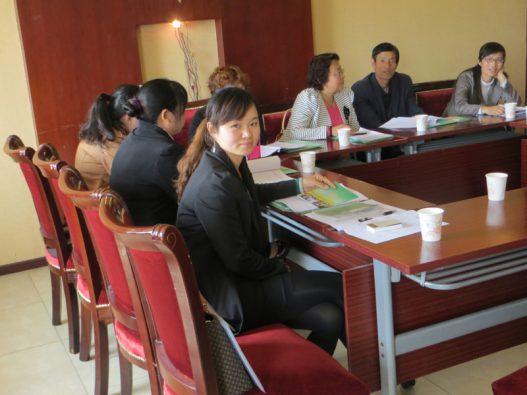The following is the text of an interview of Dave Bromwich, National President NZCFS, by John Marienthal, a member of the South Bay chapter of USCPFA (United States China Peoples Friendship Association), about work being done today by NZCFS in China. It appears in the 2017 Winter edition of ‘US-CHINA REVIEW, Volume LXI No. 1‘.

Rural Co-ops Battle “Poverty of Opportunity”
By John Marienthal
Editor’s note: In the 1930s, New Zealander Rewi Alley helped popularize small-scale cooperatives in China.
John Marienthal, a member of the South Bay chapter of USCPFA, conducted this interview with Dave Bromwich, president of the New Zealand China Friendship Society, about work being done today.
Dave Bromwich was interviewed in Hefei in July 2016, having met the author as a delegate of the USCPFA at the Youxie Friendship Forum ** in Guiyang, September 2014. He was very interested in his speech at that forum, and this led on from that. The article content is very much determined by his questions.

JOHN: What is the cooperative spirit in China today?
DAVID: We started in 2006 in the poorer provinces as a poverty-reduction project. We used New Zealand government funding. Now the training programs can assist any cooperatives. It is a fundamental part of Chinese government policy to make the east and west parts of the country, and the cities and rural areas, more equal.
Part of their rural economic development policy is to establish more rural cooperatives. There are two approaches: Cooperatives or large-scale farming systems. Cooperatives blend very well into larger-scale farming systems. As more farmland is available, as more people migrate to the cities, more farmers have the opportunity to lease land. The co-ops can improve the scale, not necessarily through collectivizing their land, but often through the marketing system—where they can market their products on a much more efficient scale of economy.
We mainly work on projects that involve collective marketing. For example, a small-scale operation in western Gansu Province can get contracts to supply Beijing companies. Some larger cooperatives are starting to export because they have the production scale that allows them to market.
JOHN: Who do you represent?
DAVID: I represent the New Zealand China Friendship Society. I work with a colleague, Liu Guozhong from Shandan Bailie School, which was founded by Rewi Alley in Shaanxi Province and moved to Gansu in 1944. He has a master’s degree in rural economic development and also represents ‘Gung Ho (Working Together)’, the International Committee for Promotion of Chinese Industrial Cooperatives. The other is Tim Zachernuk, a Canadian who has lived in China for 20 years. He’s a World Bank expert.
It is a very good small team, that started work in 2006 on a small scale. We focused on two projects in one small county and established that as a model county. We then extended that to four other counties, then expanded into other provinces.
Our Chinese counterparts have included the agricultural departments responsible for rural economic development and heads of economic management stations.
Often, we have teamed with the All China Women’s Federation because we are trying to assist with women’s development in those rural areas. Very often, women are left behind in the countryside when the men go away for work. Women run the farms. The All China Women’s Federation is trying to promote the participation and development of women in society. The cooperatives range from animal husbandry to fruit growing to women’s handicrafts.
JOHN: About how many people are we talking about?
DAVID: They all start very small—sometimes 10 or 12 people. An indication of the success of our cooperatives is that they quite rapidly increase. We have cooperatives of 30 to 40 people. Our biggest one is over 500 members. I think that there is a danger when they become too large that the management and the membership become too distant. One of the keys to the success and sustainability of the cooperatives is the transparent relationship between the members and leadership.
Until 2013, our projects were funded by aid from the New Zealand government. There were about 90 co-ops, mainly in Gansu and Shaanxi. At that point, we had assisted about 20,000 households.
Now, instead of New Zealand government aid, we get some money from a wealthy businessman in Shaanxi. Also, rather than working with specific co-ops and developing model cooperatives, we are now offering training programs. These are for marketing, accounting, management and communications.
Another aspect of what we’re trying to develop is a marketing brand. Branding will often be more effective in pre-production. Women’s handicrafts are often keen on identifying their products as handmade. We have a training class for women’s handicrafts, specifically on how to market products in shops and villages.
JOHN: Is there any possibility of going back to using part of the old model of expanding cooperatives in particular areas? Is that do-able if there were funding?
DAVID: I think there is, because we have just had a very recent project that is not funded by the New Zealand government but has small-scale funding by the Friendship Society. It will target other areas where Rewi Alley worked.
JOHN: Who had the idea to put this together?
DAVID: My colleague Liu Guozhong in Shandan, who had been involved in Gung Ho, and myself had the idea. As a community development program using cooperatives as a tool for rural development, we are working very much in the legacy of Rewi Alley—but in the modern climate.
The Chinese government policy is very supportive of that climate. One of our points of difference with the approach of the Chinese government is that, in our cooperatives, we have a much more participatory bottom-up approach. Our co-ops are able to be established in a sustainable way because of the relationship between membership and leadership. It is a real form of community democracy.
JOHN: Yeah, it encourages more democratic participation. This sometimes is a contradiction with the Chinese government’s approach, which tends to be a little more top-down.
DAVID: It has been. But, more and more where we work—particularly in Shaanxi and Gansu—we are getting support from the local government. However, our trainers don’t actually receive fees for their work. They are doing the work for expenses—for virtually no fees. My colleague from Shandan is taking two years leave. So we’re not talking about a $1,000-a-day World Bank developmentalist. We are talking about volunteers who have a passion for this kind of work.
JOHN: What are contradictions (mao dun)? What are some failures?
DAVID: One of our earlier failures was where the local government felt threatened by our coming in there. Generally, local governments were very receptive because, under the develop-the-west plan, they are charged with three tasks. One is to develop roads and schools. Another is technical development, for which they had adequate expertise. The third is social development—an area they really struggle with.
We had a co-op with a supply of some poor-quality seeds for planting. The whole membership lost faith in the cooperative, and that almost destroyed that cooperative.
JOHN: You mentioned cooperation with the All-China Women’s Federation.
DAVID: It has been on both a local level and provincial level in various areas.
JOHN: I’ve always considered the All-China Women’s Federation a really powerful national tool that could do a lot—probably a lot more than it is doing. It has the potential because of the migration of men to the cities. There are huge numbers of women left in the countryside. They can be organized. That organization has a lot of history organizing women.
DAVID: Yes, that’s right. That’s why we partner with them. Our first projects in Shaanxi were through the Women’s Federation. And we’ve had co-operatives that were run by women. There was one very effective woman in a very remote area of Shaanxi running a pig co-op.
One thing that we found out: Not only do rural Chinese have poverty, but they have a poverty of opportunity. When they are given opportunity, they develop very fast—and leaders emerge.
__________________________________
Dave Bromwich, president of the New Zealand China Friendship Society (NZCFS), has been involved in China since 1990. Since 2002, his main work has been in rural poverty-reduction development projects. This has been in a private capacity in Guangxi and Guizhou provinces, and by representing NZCFS in its work, especially in northwest China.
For information on how to support his program, contact Bromwich at [email protected].
For a pdf of the complete US-CHINA Review, Winter 2017 edition, Click HERE . Note that the above interview is on page 18
NZCFS Editor’s notes:
** The Youxie Friendship Forum, where Dave Bromwich met John Marienthal, was a major event for the 2014 Prominent Persons and Leaders Delegation.
Your editor wishes to thank USCPFA for permission to use the image of front page of their US-CHINA Review, Winter 2017 edition, and the pdf of that edition, as well.




